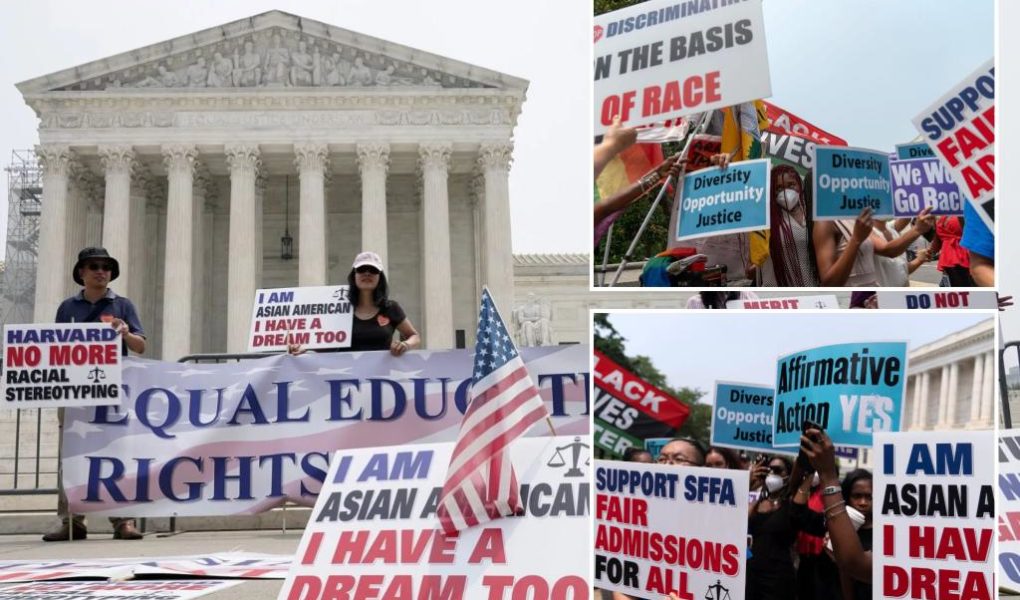America has no caste system.
There is no titled nobility barring entry to talented people based on their family background.
In America, your race doesn’t prevent you from getting into a good college or scoring a great job.
You get ahead not on the color of your skin but on the content of your character — and your contributions.
But do you?
Not lately. It turns out we’ve been living in a strictly enforced aristocracy — one based on where you fall in the “intersectional hierarchy” or oppression index.
We’ve replaced color-blindness with merit-blindness and left ourselves utterly in the dark as to how to find competent individuals to start fixing our most serious problems.
As the Asian students who just won their case at the Supreme Court found out the hard way, your ethnic heritage can indeed work against you at America’s preeminent DEI — diversity, equity, inclusion — enforcement camp, formerly known as the Ivy League.
When the Supreme Court struck down affirmative action in higher education in Students for Fair Admissions v. Harvard, many cheered.

Finally, our sacred meritocracy would be restored! Excellence would matter again. A student’s intellectual ability would be valued again. GPAs and SAT scores might even make a comeback!
It remains to be seen if the law will have any effect on the blatantly unconstitutional practices long entrenched at college-admissions offices.
Backwards job quotas
But make no mistake — ugly racial quotas and unconstitutional policies are in full effect at corporate America’s HR departments. Anyone who works at a large company understands this.
Less-qualified people are routinely hired and promoted over others based on shallow, literally skin-deep metrics.
Hiring employees from disfavored demographic groups — men, Asians, heterosexuals, whites — won’t help boost your corporate ESG (environment, social and governance) score, so why bother?
Could the new Supreme Court ruling also apply to corporate America? As 13 courageous state attorneys general recently pointed out in their letter to the Fortune 100 CEOs, it sure does.

“Let there be no confusion: These principles apply equally to Title VII and other laws restricting race-based discrimination in employment and contracting. Courts routinely interpret Title VI and Title VII in conjunction with each other, adopting the same principles and interpretation for both statutes,” they wrote.
“Accordingly, the Supreme Court’s recent decision should place every employer and contractor on notice of the illegality of racial quotas and race-based preferences in employment and contracting practices.”
It’s thrilling to see state officials take their obligations to enforce anti-discrimination laws seriously. Kudos to the AGs from Kansas, Tennessee, Alabama, Arkansas, Indiana, Iowa, Kentucky, Mississippi, Missouri, Montana, Nebraska, South Carolina and West Virginia.
Could these 13 states forge a new meritocratic alliance? A sanctuary region where skilled and talented people of any race could flourish without kneeling to the woke DEI gods?
Of course, the Trump administration deserves credit for starting this pushback; its Department of Labor launched investigations into Microsoft and Wells Fargo over racial preferences and representation goals.
But starting in 2020, the newly energized equity freight train plowed through the boardroom of every big company.
What will the long-term consequences of this practice be in terms of competence, reputation and profit? Incredibly, even the airlines announced they would be hiring new pilots according to strict affirmative-action guidelines.
In 2021, United Airlines vowed to make sure at least 50% of its new pilots are women or people of color. In 2023, Bud Light told United, “Hold my beer.”

Making corporate DEI illegal is also good for the companies. If applied, this law would prevent them from making terrible business decisions — decisions that harm qualified applicants, keep talented people from achieving success, wreck valuable brands and make flyers worry about their plane crashing.
As the AG letter concludes, “Social mobility is essential for the long-term viability of a democracy, and our leading institutions should continue to provide opportunities to underprivileged Americans. Race, though, is a poor proxy for what is fundamentally a class distinction.
We urge you to immediately cease any unlawful race-based quotas or preferences your company has adopted for its employment and contracting practices.
If you choose not to do so, know that you will be held accountable — sooner rather than later — for your decision to continue treating people differently because of the color of their skin.”
Federal law is now crystal clear that these corporate policies are illegal.
We will see whether the Biden administration — which has so loudly claimed to support the Civil Rights Act — will enforce it.
Vivek Ramaswamy is a 2024 Republican presidential candidate.
𝗖𝗿𝗲𝗱𝗶𝘁𝘀, 𝗖𝗼𝗽𝘆𝗿𝗶𝗴𝗵𝘁 & 𝗖𝗼𝘂𝗿𝘁𝗲𝘀𝘆: nypost.com
𝗙𝗼𝗿 𝗮𝗻𝘆 𝗰𝗼𝗺𝗽𝗹𝗮𝗶𝗻𝘁𝘀 𝗿𝗲𝗴𝗮𝗿𝗱𝗶𝗻𝗴 𝗗𝗠𝗖𝗔,
𝗣𝗹𝗲𝗮𝘀𝗲 𝘀𝗲𝗻𝗱 𝘂𝘀 𝗮𝗻 𝗲𝗺𝗮𝗶𝗹 𝗮𝘁 dmca@enspirers.com




